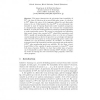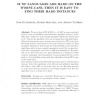451 search results - page 90 / 91 » Some Lower Bounds on Geometric Separability Problems |
121
Voted
CHES
1999
Springer
15 years 6 months ago
1999
Springer
The strength of a cryptographic function depends on the amount of entropy in the cryptovariables that are used as keys. Using a large key length with a strong algorithm is false co...
100
click to vote
ICDCS
2010
IEEE
15 years 5 months ago
2010
IEEE
—Wireless communication is particularly vulnerable to signal jamming attacks. Spread spectrum mitigates such problem by spreading normal narrowband signals over a much wider band...
129
Voted
ALT
1995
Springer
15 years 5 months ago
1995
Springer
This paper characterizes the polynomial time learnability of TPk, the class of collections of at most k
rst-order terms. A collection in TPk de
nes the union of the languages de
n...
112
Voted
AAAI
2010
15 years 3 months ago
2010
We consider approval voting elections in which each voter votes for a (possibly empty) set of candidates and the outcome consists of a set of k candidates for some parameter k, e....
105
click to vote
CC
2007
Springer
15 years 1 months ago
2007
Springer
We prove that if NP ⊆ BPP, i.e., if SAT is worst-case hard, then for every probabilistic polynomial-time algorithm trying to decide SAT, there exists some polynomially samplable ...


